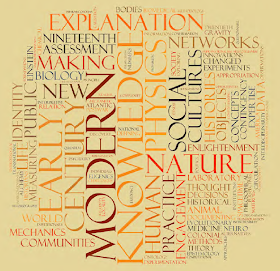Yesterday, Leah took us on a tour of this past weekend's HSS annual meeting: visibility and invisibility, epistemology and ontology, bounded rationality in history and the historical baggage of historians' modes of reasoning. What's left?
 |
| The cover to the HSS-PSA 2014 program: a word cloud drawn from the titles of papers presented at the meeting. |
In brief: during the postwar decade, pain was an object of contestation among psychiatrists, surgeons, drug companies, and other specialists vying to help aching postwar Americans to soldier on. After the passage of social security disability insurance in the mid-1950s, pain became a prominent topic for political debate. By the 1960s, a landmark court decision had established subjective pain as sufficient grounds for disability payments, and a new cybernetics-inflected theory of pain, "gate-control," had established a consolidated basis for modern pain medicine.
In Wailoo's story, pain is not just a subject for political debate, but a site where ideals became politics and policy. Such concepts as the learned pain of the "lower-back loser" and (conversely) fetal pain became the stuff of 1980s conservatism, as the right to relief had been central to 1960s liberalism. It struck me - though I may be wrong - that high politics rarely enters into history of science stories in this way, as subject matter rather than context. Can we take this distinguished lecture as an invitation to reflect on how science and technology shape the world of national and international politics, in addition to taking shape within it?
As in recent years, the human sciences were well represented at the conference. Human science panels included:
- a session on questionnaires (guest starring Robert Merton as a historical actor in a talk by UCLA grad student Eric Hounshell);
- a highly coherent grab bag on evolutionism, including papers on Darwin's moral borrowings from Adam Smith, William Whewell's inductive science of cathedral architecture, and Charles Peirce tacking between Weismann and Spencer and arriving at a typically curious theory of "evolutionary love";
- a three-part super-session on assessments of the quality of science, scientists, and scientific institutions (call it the human science of science).
This being an even year, there were philosophers in the house. I attended a crossover panel entitled "What Chemistry has brought to Philosophy." The answer, according to the comment by Sorbonne historian-philosopher Bernadette Bensaude-Vincent, was an emphasis on knowing through making. Attending to the practices of the chemical sciences could lead philosophers of science to make a distinction not between representing and intervening in the natural world, but between grasping natural phenomena and participating in them.
In the same session, Jean-Pierre Llored proposed using the tools of analytical philosophy to rezone the whole-parts-environment relationship. The payoff, Llored contended, would be a better understanding of the phenomenon of emergence and of how surroundings constitute objects and vice-versa. A chemically-sensitive philosophy of science, in Llored's view (or at least my hazy memory thereof), would not only provide a better account of science but also help attune the sciences to the manifold ways in which their objects participate in the wider world.
More scuttlebutt from the Westin Michigan Avenue:
- Cool moment: in a session on historical replication, Marjolijn Bol of the University of Amsterdam passed around fake emeralds that she made by early modern methods.
- Fun paper title: “All Aboard the Poo-Poo Choo-Choo: The Exportation of Human Waste and Environmental Justice in Post-War America,” Graham Mooney (Johns Hopkins University). (Yes, there was a historical Poo-Poo Choo-Choo.)
- Useful analytical category: Projit Mukharji of Penn described a late 19th century Indian chemist's account of silkworm disease through an amalgam of rasayana (an Indian regime of natural knowledge about material and vital processes), Anglo beliefs about the unhealthiness of drafty rooms, and Pasteurian crystallography, as "braided knowledge." (One major advantage of "braided knowledge," in my opinion, is that it doesn't carry all of the historical baggage of "hybrid" - stay tuned for more on this in an upcoming post.)
No comments:
Post a Comment
Note: Only a member of this blog may post a comment.